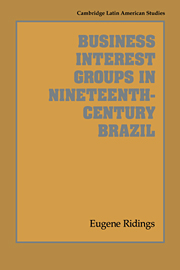Book contents
- Frontmatter
- Contents
- Acknowledgments
- Abbreviations and Usage
- Value of the Mil-reis against the Dollar and the Pound
- Brazil, with cities
- Introduction
- 1 The Genesis of Brazilian Business Interest Groups
- 2 Leadership and Organization
- 3 Influence, Ideology, and Public Relations
- 4 The Export Economy: Agricultural Quality, Markets, and Profits
- 5 The Export Economy: Banking, Credit, and Currency
- 6 The Export Economy: Manpower
- 7 Taxation
- 8 Industrialization
- 9 Communications: Regionalism Perpetuated
- 10 Port Areas and Harbors: Efficiency and Rivalry
- 11 Business Interest Groups and Economic and Urban Integration
- 12 Business interest groups and the Republic
- 13 Conclusion
- Bibliography
- Index
6 - The Export Economy: Manpower
Published online by Cambridge University Press: 27 October 2009
- Frontmatter
- Contents
- Acknowledgments
- Abbreviations and Usage
- Value of the Mil-reis against the Dollar and the Pound
- Brazil, with cities
- Introduction
- 1 The Genesis of Brazilian Business Interest Groups
- 2 Leadership and Organization
- 3 Influence, Ideology, and Public Relations
- 4 The Export Economy: Agricultural Quality, Markets, and Profits
- 5 The Export Economy: Banking, Credit, and Currency
- 6 The Export Economy: Manpower
- 7 Taxation
- 8 Industrialization
- 9 Communications: Regionalism Perpetuated
- 10 Port Areas and Harbors: Efficiency and Rivalry
- 11 Business Interest Groups and Economic and Urban Integration
- 12 Business interest groups and the Republic
- 13 Conclusion
- Bibliography
- Index
Summary
In a plantation export economy cheap, abundant labor was essential. Business interest groups sought to guarantee it for Brazilian agriculture by variously defending slavery, urging that compulsory labor be imposed on rural Brazilians, promoting the influx of Asian or African contract workers, or urging that European immigrants be induced to fill the rural labor gap. In the end, planters and business interest group fears of agricultural labor shortage turned out to be greatly exaggerated.
Business interest groups for the most part helped planters to preserve slavery longer in Brazil than in any other Western nation. Its longevity in Brazil was more than simply an embarrassment to later generations. The presence of slavery and of other low-cost labor retarded economic development by leading landowners to maintain returns by increasing labor supply, rather than emphasizing capital formation and technical progress. Slavery also retarded the growth of the mass market necessary for large-scale industrial development. In a more general sense, slavery was associated with ideological, political, and social patterns inimical to development.
Slavery in Brazil was deeply entrenched. Shortly before independence an estimated 1,887,900 of Brazil's population of 3,817,900 were bondsmen. They were concentrated in the first half of the century in the sugar growing areas of the Northeast, the old gold-mining region of Minas Gerais, and the Province of Rio de Janeiro. As coffee plantations began to flourish in the Paraíba Valley, between the provinces of Rio de Janeiro and Sao Paulo, slaves from the economically stagnating Northeast were traded there. In contrast to the United States, mortality among slaves was high and fertility low in Brazil, so that their numbers tended to decrease.
- Type
- Chapter
- Information
- Business Interest Groups in Nineteenth-Century Brazil , pp. 156 - 176Publisher: Cambridge University PressPrint publication year: 1994



